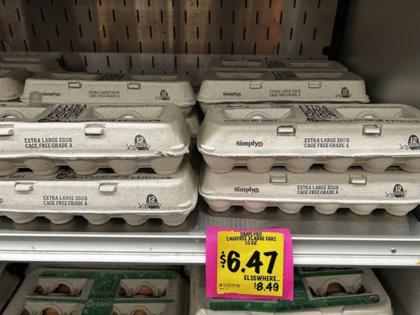Commentary: Skip the Easter eggs. Celebrate potatoes
Published in Op Eds
Easter is coming, and families may be thinking twice about shelling out $8 or more for a dozen eggs to decorate. Here’s a better idea: Use potatoes!
If any food truly represents the rebirth and fresh beginnings of Easter, it’s the potato — one of the first crops that can be planted in early spring, often as soon as the ground is workable.
Potatoes are roundish, symbolizing the continuous cycle of life, though never in a perfect circle. Potatoes have an uneven texture, as new journeys usually start with a few bumps in the road. Potato production involves no suffering, just hard work and care.
Compare the potato to the egg industry, where more than 300 million chickens endure a nightmare that lasts from birth to death. Egg factories are dark, dismal places. To dye a hen’s egg in light pastels feels disingenuous, especially since the egg industry is driving the worst bird flu outbreak in history.
In this grim pandemic, at least 166 million farmed birds — most of them egg-laying hens — have died or been systematically killed by slow, cruel methods including “ventilation shutdown” and smothering.
That’s why eggs are scarce, and why their prices are at an all-time high.
But even without bird flu, egg factories mean misery for hens. They are crammed together in wire cages about the size of a file drawer, unable to lift a single wing. Chickens are normally clean animals, but when they’re confined to crowded cages they’re forced to urinate and defecate on one another. The choking stench of ammonia and feces hangs in the air.
Easter commemorates the resurrection of Jesus Christ from the dead. In the egg industry, there’s just death. After about two years on the farm, hens’ bodies are exhausted, and their egg production drops. These “spent” hens are shipped to slaughterhouses, where their fragile legs are forced into shackles and their throats are cut. Male chicks, deemed worthless, are suffocated or ground up alive by the millions every year.
Easter is the perfect time to ask, “What would Jesus do?” In Matthew 6:26, he tells people to look at the birds, reminding us that God cares for all living beings. Surely Jesus would choose kindness and compassion over cruelty.
Choosing a kind option, like potatoes, saves chickens from terrible suffering. It also saves you money: The national average cost of a dozen large eggs was $8.15 in March. Potatoes? About a buck a pound.
Potatoes — the most popular vegetable in the United States — can be safely dyed, allowing for traditional activities like decorating, rolling and “hunting” for them. Potatoes are fun! Eggs break and quickly rot.
And if you have extra spuds left over, why not add them to your Easter dinner menu? Potatoes are an energy-boosting vegetable high in nutrients and fiber. They are rich in potassium, which helps to regulate blood pressure. They contain antioxidants, which help to reduce inflammation and maintain a healthy heart. And potatoes are naturally cholesterol-free. One large egg, on the other hand, contains about 186 grams of cholesterol, so keep a doctor’s phone number in your Easter basket.
Potatoes grow underground, hidden from view, only to emerge with the promise of renewal and growth. Likewise, let us open our minds and see animals in a new light — as sensitive, complex individuals worthy of dignity and respect. This and every year, fill your Easter basket with love, spirituality and plenty of potatoes.
_____
Scott Miller is a staff writer for the PETA Foundation, 501 Front St., Norfolk, VA 23510; www.PETA.org.
_____
©2025 Tribune Content Agency, LLC.




























































Comments